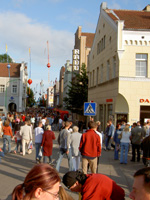
|
| "Look Up" by Aaron Shelton. Used with permission.
|
In the off chance that I am ever asked to help a board decide between two presidential candidates, I know what my tie-breaker question will be.
"Have you ever worked for hospice?"
The quality I'll be looking for can be found other places, of course — among twelve-steppers, for example, and midwives. A — and perhaps the — central gift of leadership is an absolute matter-of-factness in the midst of the most swirlingly strange public moments, and more than that, the ability to give the strangeness a context.
One of my daughters recently attended Camp Dragonfly, a hospice-sponsored event for kids who have lost loved ones to death. So, on a sunny Sunday afternoon I found myself with a few dozen other parents in a mercifully cool lodge basement talking about the weekend.
After we were walked through the schedule of activities, we were invited to ask questions, not just about the camp but also about our experience with our kids.
The camp is not limited to those whose family members were in hospice care. Death is death, bereavement is bereavement, and as hospice folks point out, there are no grief olympics.
This led to some interesting dynamics. The "grandpa died" folks tended to be freshly scrubbed and earnest. They spoke first, with questions about kids wanting to come into the parents' rooms at night. Soon, though, we heard from the "mommy sacrificed daddy and 11 neighbors to the ancient Babylonian gods" folks (OK, that's not a real example, but suffice it to say that terrible things do happen). After about 10 minutes of questions like, "What should you tell the kids when there are news cameras pushed against your kitchen window?" ("Well, it's sort of hard to fudge at that point," came the reply), the "grandpa died" folks were looking distinctly ashen. The hospice lady took this in as she glanced around, tilted her head and said, "We've had more traumatic death than usual this year."
The effect on the group was immediate. Those who had been through those traumas knew that they were being taken seriously and that they were not alone. Those whose experiences were not so public were reassured that all was well, that the extremes in the group were within the facilitator's experience of "normal," and that the focus remained on their kids' common process of grieving.
The hospice lady had three distinct spiritual gifts operating at the same time.
The first was discernment, which in this case was largely a matter of paying attention. She caught the fear on the faces of those whose experience with death had been more mundane, and she knew the word that would take that fear away. She knew when people needed something more than the group could offer, and made it available for them. And she knew what her agenda was, when she was departing from it, and why.
She had faith, in this case manifested as unflappability. Long-term proximity to death can have this effect. She knew that nothing had gone on in the lives of those in that room (or their kids) that couldn't be healed. That was the source of her calm.
Oh, and wisdom. It isn't entirely a matter of experience, although that helps. It comes from knowing what is important in a conversation. It wasn't necessary for the folks who had experienced the most traumatic bereavement to tell their stories in detail yet again. She heard what she needed to and gently deflected the rest. She knew it was necessary for those whose experience was less traumatic to hear a bit about what others had been through, just to help put their own experience in context, but she didn't leave them traumatized.
She incarnated grace in that basement. I'd hire her in a heartbeat.